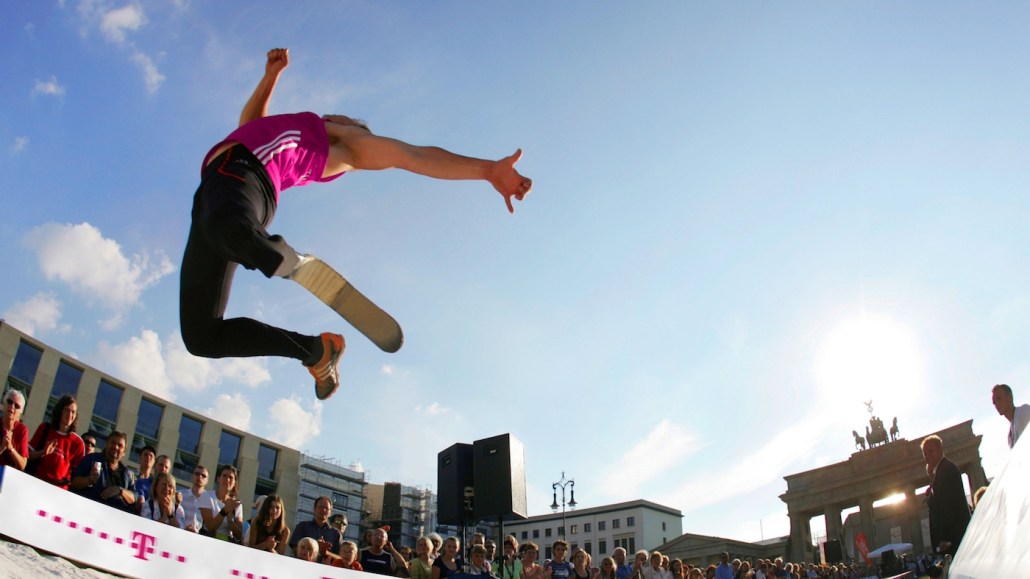Save 50% on a 3-month Digiday+ membership. Ends Dec 5.
‘It makes no sense to run our media business with one agency’: Deutsche Telekom cements its new media strategy

Deutsche Telekom no longer sees itself paying one agency to plan and buy all its media now that it has more control over how its media is bought.
From ad tech contracts to metrics, the telecommunications company handles tasks it previously delegated to agencies, thanks to a new model. It would be an “overstatement” to ditch agencies altogether, said Gerhard Louw, who leads international media management at Deutsche Telekom, but the advertiser has spread what one agency once handled across several advertising specialists. There’s “more effectiveness” to be gained by having different partners that are more specialized, Louw explained.
A team at Deutsche Telekom’s Bonn, Germany, headquarters directs its relationships with each specialist, while media managers and business executives handle the operational aspects in each market. The work an agency would’ve done for the advertiser is split into four buckets: media analytics services, programmatic operations, search advertising and affiliate marketing services, and campaign planning and buying services.
Programmatic is the part of the plan on which Deutsche Telekom chose to keep the tightest grip. Data specialist Emetriq, a wholly owned Deutsche Telekom subsidiary, will handle the advertiser’s programmatic buys, including on social media, moving forward. This will ensure “data-driven” and automated buying of media from a “single, internal source,” said Dr. Christian Hahn, the firm’s top marketer. Hahn said Emetriq will oversee upfront, guaranteed and private deals for online media as well as run auction-based campaigns on open exchanges and social networks. TV, outdoor, radio and other media will be added to those bids as they go programmatic.
It was only a matter of time before Deutsche Telekom took more control of media buying, said Hahn. As more of the company’s ad budget flows to platforms like Google and Facebook, with which it works directly, the advertiser found itself doing more of the tasks an agency would have handled. With Emetriq, Deutsche Telekom benefits from direct relationships with publishers in certain markets like Germany and no hidden fees, without the worries of data leakage and poor transparency on its buys.
Although the advertiser owns Emetriq, Hahn and Louw stressed there are no plans to move ad buying into the main media team. Whether Deutsche Telekom takes programmatic in-house depends on how the market develops and how the “organization’s ambition develops,” Louw said. Other advertisers are considering bringing programmatic in-house, too, which could have massive implications for media agencies. Programmatic is where the money is in advertising — it’s where the margin is made that flows to the rest of the business.
“It makes no sense to run our media business with one agency when there are so many different requirements across our subsidiaries,” said Hahn.
Ad position: web_incontent_pos1
When hiring search and affiliate businesses, Deutsche Telekom decided to work with local specialists in 11 of its 13 European markets. The needs of Deutsche Telekom’s subsidiaries across Europe are vastly different, so some will retain their existing supplier, while others will switch following local account reviews.
For media analytics, the advertiser picked Neustar and Objective Partners to more closely connect the media mix, budget allocation and ad placements to business outcomes. For Deutsche Telekom to change the way it tracks its media, it will need measurement that its finance team can understand.
GroupM, as Digiday reported last year, is tasked with Deutsche Telekom’s media planning and buying for TV, print, outdoor and experiential, radio, and cinema that involves the advertiser’s marketers working with Mindshare in some markets and MediaCom in others. The WPP-owned agency will also buy display, online video, social and some programmatic, as it relates to the negotiation and execution of upfront, guaranteed and private deals.
Getting different businesses with different models and agendas to collaborate will be tricky. Agencies “weren’t always delighted by our model for their own reasons,” Louw said. But there are signs the approach is working: Deutsche Telekom’s model has already “exceeded expectations” during a national campaign in the Netherlands, with workshops where agencies and other marketing service providers were briefed at the same time. Those suppliers were also asked come up with a clear way they would collaborate that saw them outline their roles and responsibilities.
Part of the trick to getting each business to collaborate stems from a revamped remuneration model that punishes them for not collaborating. Other performance-related KPIs are also included in order to incentivize agencies to race to the top on value, instead of racing to the bottom on price.
Ad position: web_incontent_pos2
Media-savvy companies like Deutsche Telekom are increasingly working with more specialists to take more control of decisions and contracts, said Tom Denford, who advised Hahn and Louw in his role as chief strategy officer at marketing consultant ID Comms. To be successful requires some planning, Denford explained, because “you have to carefully align KPIs across your different partners and be able to measure both their contribution and their collaboration.” “I’m not surprised that many other major advertisers are wanting to talk to Deutsche Telekom to find out how they did it,” Denford said.
Image courtesy of Deutsche Telekom.
More in Media

What publishers are wishing for this holiday season: End AI scraping and determine AI-powered audience value
Publishers want a fair, structured, regulated AI environment and they also want to define what the next decade of audience metrics looks like.

Digiday+ Research Subscription Index 2025: Subscription strategies from Bloomberg, The New York Times, Vox and others
Digiday’s third annual Subscription Index examines and measures publishers’ subscription strategies to identify common approaches and key tactics among Bloomberg, The New York Times, Vox and others.

From lawsuits to lobbying: How publishers are fighting AI
We may be closing out 2025, but publishers aren’t retreating from the battle of AI search — some are escalating it, and they expect the fight to stretch deep into 2026.
Ad position: web_bfu



